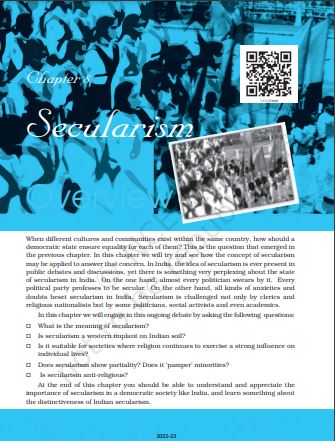‘NCERT Solutions for Class 11 Political Science Chapter 8 Secularism‘ PDF Quick download link is given at the bottom of this article. You can see the PDF demo, size of the PDF, page numbers, and direct download Free PDF of ‘Ncert Class 11 Political Science Chapter 8 Exercise Solution’ using the download button.
Secularism NCERT Textbook With Solutions Book PDF Free Download

Chapter 8: Secularism
Though Jews faced discrimination for centuries throughout Europe, in the present state of Israel, Arab minorities, both Christian and Muslims, are excluded from social, political, and economic benefits available to Jewish citizens.
Subtle forms of discrimination also continue to persist against non-Christians in several parts of
Europe.
The condition of religious minorities in the neighboring states of Pakistan and Bangladesh has also generated considerable concern. Such examples remind us of the continuing importance of secularism for people and societies in today’s world.
Inter-religious Domination In our own country, the Constitution declares that every Indian citizen
has a right to live with freedom and dignity in any part of the country. Yet in reality, many forms of exclusion and discrimination continue to persist.
Consider three most stark examples:
o More than 2,700 Sikhs were massacred in Delhi and many other parts of the country in 1984. The families of the victims feel that the guilty were not punished.
o Several thousands of Hindu Kashmiri pandits have been forced to leave their homes in the Kashmir valley; they have not been able to return to their homes for more than two decades.
o More than 1,000 persons, mostly Muslims, were massacred during the post-Godhra riots in Gujarat in 2002.
The surviving members of many of these families could not go back to the villages in which they lived. What do these examples have in common?
They all have to do with discrimination in one form or the other. In each case members of one community are targeted and victimized on account of their religious identity.
In other words, the basic freedoms of a set of citizens are denied. Some might even say that these incidents are instances of religious persecution and they reflect inter-religious domination Secularism is first and foremost a doctrine that opposes all such forms of inter-religious domination.
This is however only one crucial aspect of the concept of secularism. An equally important dimension of secularism is its opposition to intra-religious domination. Let us
get deeper into this issue.
| Author | NCERT |
| Language | English |
| No. of Pages | 18 |
| PDF Size | 1.4 MB |
| Category | Political Science |
| Source/Credits | ncert.nic.in |
NCERT Solutions Class 11 Political Science Chapter 8 Secularism
Question 1.
Which of the following do you feel are compatible with the idea of secularism? Give reasons.
(a) Absence of domination of one religious group by another.
(b) Recognition of a state religion.
(c) Equal state support to all religions.
(d) Mandatory prayers in schools.
(e) Allowing separate educational institutions for any minority community.
(f) Appointment of temple management bodies by the government.
(g) Intervention of state to ensrure entry of Dalits in temples.
Answer:
(a) This idea is compatible because:
- Due to equality, the majority of religious people will not dominate minority religious people.
- Minority religious people also enjoy the freedom to practice any belief, or way of worship, and to preach as well.
(b) It is not compatible because such a situation prevails only in religious-dominated state.
(c) Equal support to all religions by state cannot be provided because:
- One state can have 10 festivals to be celebrated where as the other may have only 2 or 4.
- The ways of worship are also different which is not possible for state to follow different methods.
- Hence, it should be left on religious community or individual’s will.
(d) It is not compatible because students, teacher,s and employees are free to adopt their own way to offer prayer.
(e) It is compatible to provide protection and security to people of minority religious groups.
(f) It is not compatible to be the direct involvement of state and or government in religious affairs.
(g) It is compatible because:
- The weaker sections will not be denied the freedom to adopt any religion on grounds of being a lower caste.
- Secularism does not challenge only inter-religious intra-religions domination also.
- State’s efforts promote freedom within religions as well as equality among them.
Question 2.
Some of the key characteristics of the western and Indian models of secularism have got mixed up Separate them and make a new table.
| Western Secularism | Indian Secularism |
| 1. Strict non-interference of religion and state in each other’s affairs | 1. State supported religious reforms are allowed |
| 2. Equality between different religious groups is a key concern. | 2. Equality between different sects of a religion is emphasized. |
| 3. Attention to minority rights | 3. Less attention to community-based rights |
| 4. Individual and his rights at the centre | 4. Rights of both individual and religious community are protected. |
Answer:
| Western Secularism | Indian Secularism |
| 1. State supported religious reforms are allowed | 1. Strict non-interference of religion and state allowed.in each other’s affairs. |
| 2. Equality between different sects of a religion is emphasized. | 2. Equality between different religious groups is a key concern |
| 3. Less attention to a community-based rights. Individual and his rights at the center | 3. Attention to minority rights. Right of both individual and religious communities are protected |
NCERT Class 11 Political Science Textbook Chapter 8 Secularism With Answer PDF Free Download
